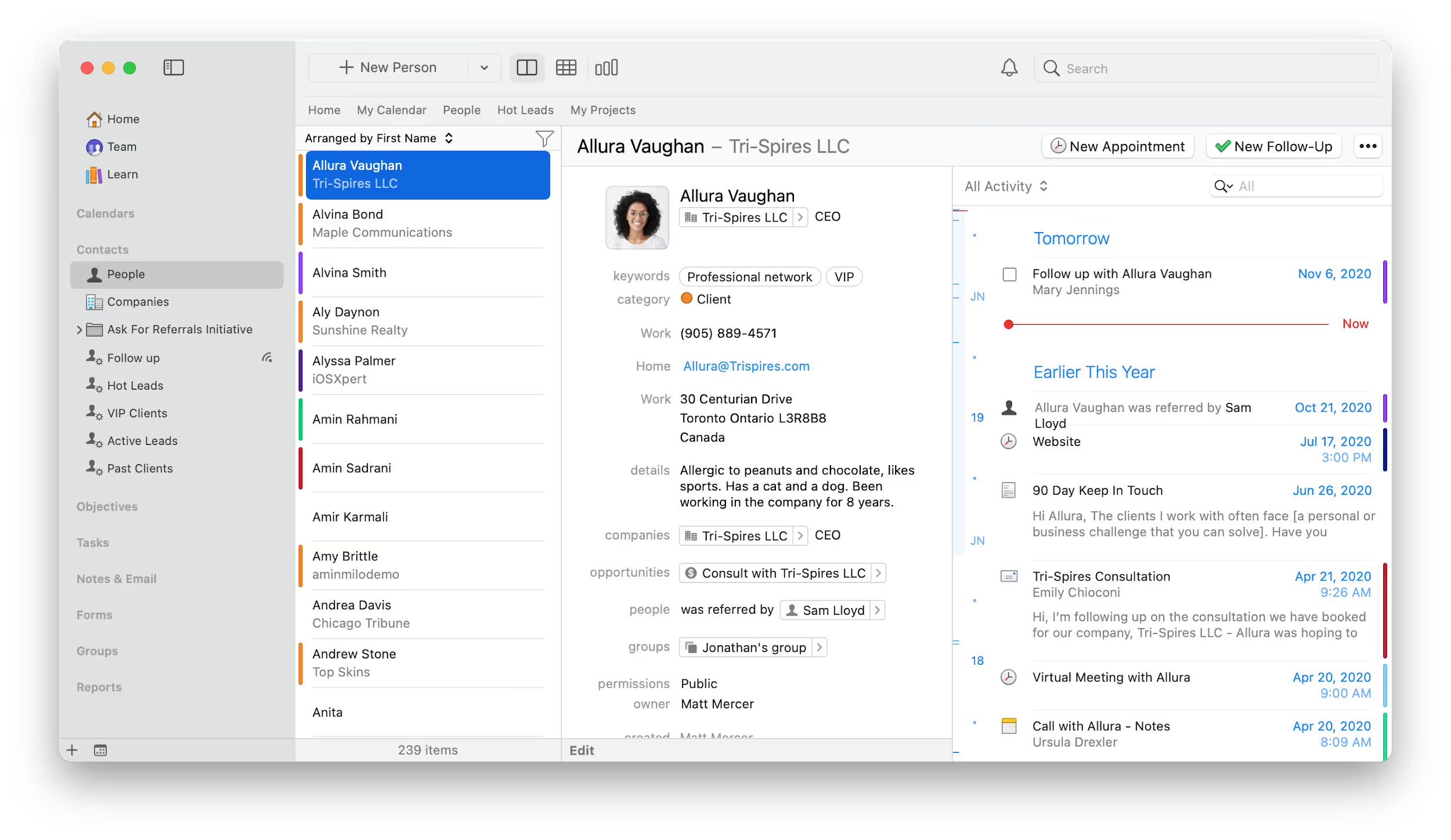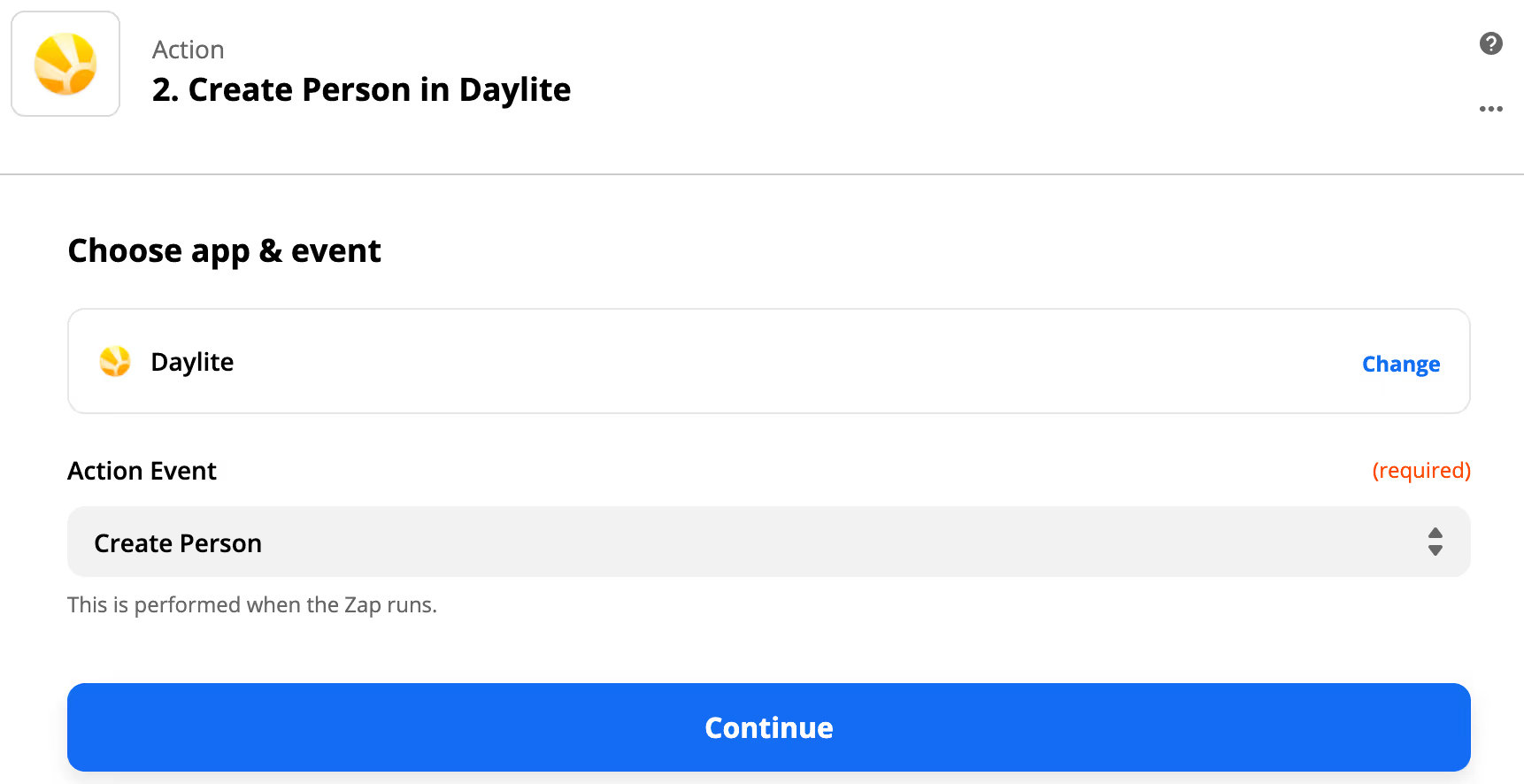How to Track Client Communications with a CRM
How to Track Client Communications with a CRM

This is a guest post by Kristie Holden, VP of Marketing at Daylite.
Keeping track of communication and action items is essential to building strong relationships with clients and growing your business. This is especially important when you’re in professional services where your relationships are the lifeblood of your business.You’re bound to get more repeat clients and referrals when you build strong relationships because clients trust you.
The challenge, however, is keeping track of all the information, communication, and action items with clients as your business grows. When you only have a few clients, it’s relatively easy to rely on your memory, notes, or search your inbox for details to remember what you last spoke to a client, what was said, and what needs to get done next on a project.
As your client list grows and you hire more people, keeping track of what’s been discussed with clients and what you or team member’s have committed to quickly becomes messy and eventually chaotic. When a client says to follow up in 6 months, how do you make sure they get a follow-up? Spreadsheets and Google docs may work better than your memory and post-it notes, but they don’t allow you to have visibility over the history of communication with clients and they don’t help you stay on top of follow-ups to ensure you’re touching base with clients and leads regularly.
Growing your business gets way easier when you have oversight over communication with clients and the status of projects. The challenge is that with more clients and employees comes an increase in status update meetings, Slack messages, and emails you need for proper visibility into what’s happening.
This is where a CRM can help: it will enable you to centralize communication and action items with leads and clients and share everything with your team so they’re on the same page.
So what is a CRM, really?

“CRM” is an acronym for Client Relationship Management: They are systems that allow you and your team to log all your interactions with clients in one place. All emails, phone calls, appointments, notes, and follow-up items are logged under a client or lead, so you have easy access to context and important details the next time you engage with them (no need to remember what was said on a call three weeks ago). With a CRM, you have full transparency over communication with clients and the status of deals. Plus, you get to control what information is added, viewed, and/or edited by various team members for privacy purposes.
For example, say you have a new lead that’s interested in your services and your sales rep collects information about their needs and budget. After some back and forth, the potential client says they’re not ready to pull the trigger just yet and ask to touch base in 6 months. With a CRM, your sales rep can record the information about the lead’s needs and set a reminder to touch base in 6 months. Even if that sales rep who originally spoke to the lead is no longer with your company, you and/or other sales reps in your company can access the information and ensure the potential client gets a follow-up call with someone who “knows what’s going on.”
Long story short: You have a lot of clients and leads, but your clients are likely only hiring one lawyer, financial planner, or real estate agent, or other service professional — so they remember you. With a CRM, you can provide a personalized experience for your clients without needing a photographic memory.
Benefits of using a CRM
There are many benefits to using a CRM. According to this survey from FinancesOnline, businesses that use CRMs saw an 87% improvement in sales, 74% increase in customer satisfaction, and 73% improvement in business efficiency.
- Improved client satisfaction: By using a CRM, you and your employees can easily view the history of communication with a client to refresh your memory and pick up where you last left off. This helps you remember important details that make your clients feel special, while avoiding details from slipping through the cracks.
- Increased close rate: A CRM allows you to keep track of every lead in a central database along with follow-ups to ensure deals are pushed forward and details are remembered so you can win more clients.
- Increased operation efficiency: Using a CRM saves your team time.
Instead of having to interrupt people with Slack, emails, or meetings to find out what was discussed with a client or how many deals are in the pipeline, it’s all visible in your shared CRM.
What to look for in a CRM
When choosing the right CRM for your business, there are many important factors to consider such as who will need access to the CRM (how many users), the main inefficiencies in the business processes you need the CRM to streamline, your budget, and the type of business you’re running, etc.
Here are a few key things that are especially important for professional services businesses such as real estate agents, lawyers, and financial advisors to keep in mind when choosing the right CRM.
- Mobile access: For service businesses where you’re often on the go or have reps working on-site with clients, you’ll want to make sure that the CRM you choose has mobile access so client information and action items can be captured on the go.
- Ease of setup: For businesses in professional services, your money is made from time with clients, not time spent setting up your software. Look for a CRM that you and your team can get up and running with relatively quickly. While there are many robust CRMs on the market, some of them require a lot of time for setup and employee training. That could mean months or even years before you start to see an ROI – not to mention that using a CRM is going to involve changing people’s habits. It’s best to find a solution that you and your team will enjoy using and that you can implement in a reasonable amount of time.
- Customizability: Depending on your industry, there may be industry-specific solutions that require minimal customizing to work for your business such as real estate or legal. The downside is these are often more expensive and sometimes more rigid so, if they don’t fit your specific workflow, they can be tough to change. The alternative is to find a CRM that is industry agnostic and allows you to customize and mold it for your business – your customer onboarding process, your sales process, and how your team operates. Some CRMs can be easily customized, where others may require thousands of dollars to invest up front to fit your specific needs.
- Reporting: CRM is not just about the data you put in and review, it’s also about helping you draw insights – what’s your close rate? How many deals are in various stages of the sales pipeline? How many clients do you have that are interested in service XZY that you can send an email campaign out to? When choosing a CRM, keep in mind the kind of reports and insights you want to find and whether or not the solution will allow you to get visibility on that data.
- Value: There are many CRMs on the market ranging from free to hundreds of dollars per month per user. Finding the right CRM requires you to find the balance of features and cost that work for you. Choosing a free CRM may be cost effective in the short-term, but if you can’t customize it as you grow and your needs expand and you take on more clients and employees, it’ll hold you back from growing and cost you money in the long term.
- Customer service: As a professional services business, you know how important customer service is. If you run into an issue with your CRM, it’s great to know the vendor has a great support team that’s quick to respond and helpful. While some of the “big guys” in the CRM space are more well known, some of the drawbacks are that support is costly or slow to respond. Do your research and look up online reviews to find out about their customer service.
How to use a CRM with Smith.ai
The power of a virtual receptionist is enhanced when you have a CRM that is the central place for your calls with leads and clients to be logged. This way when your virtual receptionist gets a call from a new potential client, you can capture the lead in your CRM and sure they’re followed up with so you can win more business.
About Daylite CRM
Daylite is a CRM designed specifically for professional services businesses that use Apple devices. Daylite helps you and your team get an overview of communication with clients, track the status and next steps on deals, and collaborate on client projects – all in one app. Daylite is a real Mac and iOS app meaning you can store your client information right on your device so you can capture or pull up client details even when you don’t have an Internet connection. Plus it works with Apple apps you already use like Apple Mail, Siri, Reminders, Apple Contacts and Apple Calendar.
Integrating Smith.ai and Daylite

Using Zapier, you can setup an automated workflow so that when your Smith.ai virtual receptionist takes a call from a lead or client, the information such as their name, company info, contact info, and details can be logged in your Daylite CRM so the communication is all in one place.
How it works
Once you connect Smith.ai and Daylite (using Zapier), all calls taken by your Smith.ai receptionists will automatically be logged in your Daylite CRM as either a person or a company. Then, when you check your Daylite account, you can see the call summary, what time they called, their contact information — name, email, and phone.
Then when you're ready to meet with the client, you know exactly what they told you receptionist — giving them a better client experience than if they had to repeat the previous conversation.
Bonus! You can also connect your Smith.ai Chat account to Daylite. That means every new lead captured by the chat widget on your site is added to your Daylite CRM, along with their name, email, phone number, a transcript of the chat, and other information relevant to your business.
How to set it up
Ready to get started? You'll need a Smith.ai virtual receptionists or chat account, a Daylite account, and a free Zapier account (don't worry, you don't need to know how to code for this). Here's how to set up the Zap in 4 steps:
- Create a Zap with Smith.ai as a trigger. Connect your Smith.ai virtual receptionists or chat account here.
- Add Daylite as an action by searching for it in Zapier.
- Choose custom data to add to specific fields in Daylite.
- Test the Zap with a call or chat! Once you're done, you should have

Click here for full instructions for connecting Smith.ai to Daylite.
Want to learn more about Daylite? Visit Marketcircle’s website to start a free 30-day trial or get started with a free consultation.
Take the faster path to growth. Get Smith.ai today.
Key Areas to Explore

Your submission has been received!














.svg)



